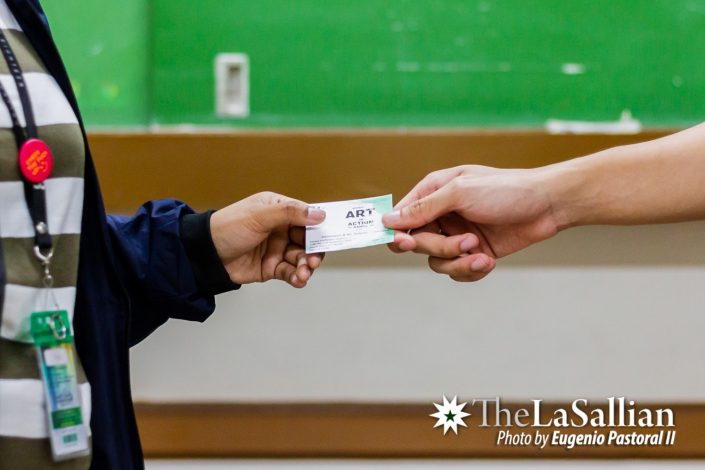Amid the bustle of long tests, presentations, paper defenses, and other academic requirements, students who look to supplement their grades can turn to incentives. Attendance and active participation in seminars, conferences, forums, and other activities may prove pivotal in pulling up a student’s class standing. In other cases, points earned from accomplishing incentives is crucial in obtaining a passing mark for a particular class.
Albeit the perks, it is not uncommon for incentivized activities to require attendees to shell out money just to get a guaranteed spot—organizations hosting these events have expenses they need cover as well. Even though incentivized events could make, break, or stabilize final grades, the high prices students pay for some of these events is a cause for concern.
Behind the incentive system
“As far as incentivizing events, I think most organizations do that. I think it’s a multi-purpose thing, that’s why they do it,” Council of Student Organizations Executive Vice Chairperson for Activities and Documentations Carlos Mariano tells The LaSallian. He enumerates three reasons why organizations incentivize events: to boost event participation, to create events in partnership with specific departments or colleges, and to reinforce the “fourth hour activity”, or learning outside the classroom.
Mariano also says that aside from event attendance serving as additional grades for the students, these events also extend students’ learning beyond the classroom. “We know that the events they go through are not only academic in nature, but some also [tackle], let’s say, formation or growth or sometimes [involve] spiritual activities, so it’s really a holistic [type of] learning,” he adds.
According to Mariano, organizations look into two factors when incentivizing events: academic nature and scale. “When [Ramon V. del Rosario College of Business organizations] have activities [that] focus on one aspect—let’s say accounting—then [that] certain [organization] would ask the department if pwede sila makipag-partner up for incentives,” he points out.
He elaborates as well that there is no criteria followed to determine if a certain class can have a certain incentive. “There’s no secret formula na just because you’re this [organization], means that this department will help. Usually, depende sa reach talaga ng central committee,” he explains.

Debating affordability
But organizational events are not always free, and for students like Charlene Rodenas (III, AB-DSM), the prices they pay just to purchase tickets for these incentivized events are sometimes not student-friendly. “I think the tickets reached 350 to 400 pesos, which is worth two to three days of my allowance already,” Rodenas shares, referring to a play she was required to watch for one of her classes.
Mariano, however, clarifies that organizations take into consideration if event fees are budget-friendly for their participants. “The [organizers] will always think paano kung ako ‘yung student. Is the incentive worth the price I’m paying for?” he notes.
(The [organizers] will always think from the perspective of the student.)
He also points out that although each organization has their own pricing system for their events, it ultimately depends on how much the organization will spend for the activity. “Let’s say a certain speaker [costs] a certain amount, then surely they will charge the participants [a certain amount] so they will recoup what they spent [on] the activity,” Mariano explains.
But not all incentivized activities have fees, Mariano emphasizes, with the organization sometimes shouldering some of the expenses on behalf of the attendees. “If it comes to a situation where someone would really like to attend pero may price, the [organization] would more than likely often offer assistance to the person,” he adds.
Effectiveness of incentives
JL Liongson, an assistant professor of the Marketing and Advertising Department who actively gives out incentives, reasons that these activities help students gain a deeper appreciation and understanding of topics that could be applied in class. “It’s definitely an extension of what happens in the classroom. Teaching and learning extends outside the class, so we have to incentivize,” he says.
Laureen Velasco, an assistant professor from the Philosophy Department, believes that incentivized talks and seminars are appropriate as an alternative learning environment for her students. “It is also a way to give them a chance to see other teaching styles and other perspectives,” Velasco explains. She also highlights the importance of exposure, as this helps her students to see various viewpoints and approaches from different educators.
Meldrick Cheng (III, MEEMTE), however, criticizes the act of incentivizing events, warning that it may lead to abuse. Although incentivized events offer learning beyond the classroom, Cheng stresses that participants still need to be wooed over. “Students won’t join these talks without an external ‘push’,” he says.
Similarly, Rodenas argues that some students attend these events not because they want to but because they feel obligated to go “for plus points”. “It is like the audience is not organic,” she admits.
Marie Tayag (V, CAM-ADV), meanwhile, shares that incentivized external events may provide students more chances to learn things that may not be taught inside the classroom. “Attending these events with people from a certain industry gives you a wider view of your career,” she explains. However, Tayag states that some of these events may be too expensive for students and that some only attend because “they need to increase their grades.”
Nonetheless, the question still remains whether these incentivized events—voluntary or not—truly extend learning beyond the classroom, and whether this justifies the additional cash students shell out to partake in them.
